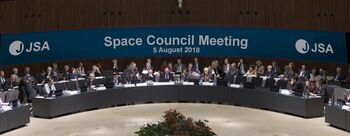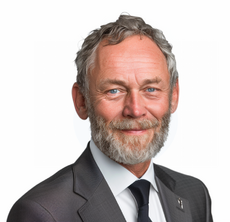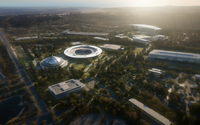User:Belfras/SandboxSpace1: Difference between revisions
No edit summary |
No edit summary |
||
| Line 54: | Line 54: | ||
{{clear}} | {{clear}} | ||
== Member states and budget == | |||
[[File:JSAMeeting2018.jpg|350px|thumb|right|The Space Council, the governing body of the JSA, meeting in 2018.]] | |||
{|class="wikitable sortable plainrowheaders" | |||
|- | |||
! scope="col" rowspan="2" | Member state | |||
! scope="col" rowspan="2" | JSA convention | |||
! scope="col" rowspan="2" | Representative | |||
! scope="col" rowspan="2" | National programme | |||
! scope="col" colspan="3" | Contributions | |||
|- | |||
! scope="col" | Test1 | |||
! scope="col" | Test2 | |||
! scope="col" | Test3 | |||
|- | |||
! colspan="7" |Full member states | |||
|- | |||
|{{Flag|Alanahr}} | |||
| TBD | |||
| TBD | |||
| TBD | |||
|style="text-align:right;" |1 | |||
|style="text-align:right;" |2 | |||
|style="text-align:right;" |3 | |||
|- | |||
|{{Flag|Belfras}} | |||
|{{dts|format=dmy|1968|8|1}} | |||
| Odoacer Bursio | |||
|[[STAR]] | |||
|style="text-align:right;" |1 | |||
|style="text-align:right;" |2 | |||
|style="text-align:right;" |3 | |||
|- | |||
| {{flag|Garima}} | |||
| TBD | |||
| TBD | |||
| TBD | |||
|style="text-align:right;" |1 | |||
|style="text-align:right;" |2 | |||
|style="text-align:right;" |3 | |||
|- | |||
| {{flag|Ghant}} | |||
| TBD | |||
| TBD | |||
| TBD | |||
|style="text-align:right;" |1 | |||
|style="text-align:right;" |2 | |||
|style="text-align:right;" |3 | |||
|- | |||
| {{flag|Gristol-Serkonos}} | |||
| {{dts|format=dmy|1971|10|20}} | |||
| TBD | |||
| [[Space and Aeronautical Research Agency|SARA]] | |||
|style="text-align:right;" |1 | |||
|style="text-align:right;" |2 | |||
|style="text-align:right;" |3 | |||
|- | |||
| {{flag|Latium}} | |||
| {{dts|format=dmy|1968|8|1}} | |||
| TBD | |||
| [[Latin Star Service|CA]] <!--Cursus Astrum--> | |||
|style="text-align:right;" |1 | |||
|style="text-align:right;" |2 | |||
|style="text-align:right;" |3 | |||
|- | |||
| {{flag|Lihnidos}} | |||
| TBD | |||
| TBD | |||
| TBD | |||
|style="text-align:right;" |1 | |||
|style="text-align:right;" |2 | |||
|style="text-align:right;" |3 | |||
|- | |||
| {{flag|Lion's Rock}} | |||
| TBD | |||
| TBD | |||
| TBD | |||
|style="text-align:right;" |1 | |||
|style="text-align:right;" |2 | |||
|style="text-align:right;" |3 | |||
|- | |||
| {{flag|Lyncanestria}} | |||
| TBD | |||
| TBD | |||
| TBD | |||
|style="text-align:right;" |1 | |||
|style="text-align:right;" |2 | |||
|style="text-align:right;" |3 | |||
|- | |||
| {{flag|Mniohuta}} | |||
| TBD | |||
| TBD | |||
| TBD | |||
|style="text-align:right;" |1 | |||
|style="text-align:right;" |2 | |||
|style="text-align:right;" |3 | |||
|- | |||
| {{flag|Onekawa-Nukanoa}} | |||
| TBD | |||
| TBD | |||
| TBD | |||
|style="text-align:right;" |1 | |||
|style="text-align:right;" |2 | |||
|style="text-align:right;" |3 | |||
|- | |||
| {{flag|Orun Redisus}} | |||
| {{dts|format=dmy|1978|10|6}} | |||
| TBD | |||
| [[NARA]] | |||
|style="text-align:right;" |1 | |||
|style="text-align:right;" |2 | |||
|style="text-align:right;" |3 | |||
|- | |||
| {{flag|Sante Reze}} | |||
| {{dts|format=dmy|1968|8|1}} | |||
| TBD | |||
| [[Kimiyye Hendreri Ofurufu Populeris|KHOP]] | |||
|style="text-align:right;" |1 | |||
|style="text-align:right;" |2 | |||
|style="text-align:right;" |3 | |||
|- | |||
| {{flag|Vannois}} | |||
| TBD | |||
| TBD | |||
| TBD | |||
|style="text-align:right;" |1 | |||
|style="text-align:right;" |2 | |||
|style="text-align:right;" |3 | |||
|- | |||
| {{VLK}} | |||
| {{dts|format=dmy|1972|4|8}} | |||
| TBD | |||
| [[DARD]] | |||
|style="text-align:right;" |1 | |||
|style="text-align:right;" |2 | |||
|style="text-align:right;" |3 | |||
|- | |||
| {{flag|Yisrael}} | |||
| TBD | |||
| TBD | |||
| TBD | |||
|style="text-align:right;" |1 | |||
|style="text-align:right;" |2 | |||
|style="text-align:right;" |3 | |||
|- | |||
<!--! colspan="7" |Cooperative members--> | |||
|- | |||
|} | |||
=== Applicant States === | |||
=== Suspended States === | |||
==== Enyama ==== | |||
{{main|Enyama}} | |||
Following the outbreak of the [[Enyaman Civil War]] on 19 September 2019 the Joint Space Agency formally announced that as no clear government existed that the membership to the Agency would be immediately suspended until otherwise stated. Since this decision, which was made in December that same year, no other information has come to light regarding the suspension of membership. It is known, however, that many employees of the JSA that are Enyaman in nationality have since relocated permanently to either Belfras or Sante Reze. | |||
== Collaboration == | == Collaboration == | ||
| Line 69: | Line 226: | ||
== Management == | == Management == | ||
As planned in the Conventions two organs are defined which work together to run the Joint Space Agency; the Space Council and the Director-General. The Space Council is composed of | As planned in the Conventions two organs are defined which work together to run the Joint Space Agency; the Space Council and the Director-General. The Space Council is composed of Representatives of the member states which meets as required at Representative or delegate level. The Director-General is appointed by the space council and serves at their leisure and in their duty represents the JSA in it's acts and executes policy defined by the Space Council. The Council has set-up subordinate bodies to be assisted in it's duties. Each of the Committees and Boards take decisions, make recommendations or are kept informed according to the amount of powers invested in them by the Council in their given area of responsibilities. Each Member States nominates its representation to the boards and committees; these delegates are often accompanied by experts. | ||
=== Space Council === | === Space Council === | ||
The primary role of the Space Council is to establish the direction and policy of the Joint Space Agency. | The primary role of the Space Council is to establish the direction and policy of the Joint Space Agency. Representatives of the space council meet every two to three years to assess current challenges, opportunities, and technological advancements in space exploration and then decide on the agency's priorities and initiatives for the forthcoming period. The Space Council is also responsible for overseeing the implementation of these policies, and to this end they appoint a director-general who will act as the executive officer for the agency and ensure that the agency's activities align with the established goals and regulatory guidelines. Oversight over these activities are conducted through an executive committee whose responsibilities include conducting oversight over all established activities and programmes, over the different divisions and support services, and finally over the director-general and administrative staff themselves. | ||
Representatives in the Space Council will be charged with appointing teams of experts to their staff and assigning delegates to attend lesser meetings which are focused on specific programmes and initiatives. These delegates and meetings allow for focused discussions, expert contributions, and a more agile decision-making regarding particular projects by avoiding unnecessary administrative efforts. As stated in the conventions, the contributions of the Representatives as representatives of the members states promotes international cooperation. This collaboration fosters a unified approach to address global challenges in space research, technological advancement, and policy regulation, furthering the peaceful exploration and utilization of outer space. | |||
=== Director-General === | === Director-General === | ||
| Line 95: | Line 252: | ||
* The JSA administrative headquarters in Thessalona, [[Belfras]]. This location houses the leadership of the Joint Space Agency, the meeting location for the Space Council, and also houses it's astronaut corps, security forces, and public relations office. | * The JSA administrative headquarters in Thessalona, [[Belfras]]. This location houses the leadership of the Joint Space Agency, the meeting location for the Space Council, and also houses it's astronaut corps, security forces, and public relations office. | ||
* | * The Space Research and Technology Center in [[Latium]], this is the largest facility dedicated to furthering research and technological developments by the agency. | ||
* Ekporte KeParaguasure Okeere (EKPO) Space Center in [[Sante Reze]]. This is the agency's primary launch facility. | * Ekporte KeParaguasure Okeere (EKPO) Space Center in [[Sante Reze]]. This is the agency's primary launch facility. | ||
* Facilities owned and operated by member-state space agencies but have close collaboration with the JSA include; | * Facilities owned and operated by member-state space agencies but have close collaboration with the JSA include; | ||
| Line 145: | Line 302: | ||
| File:JSA research Center.jpg | | File:JSA research Center.jpg | ||
| alt3= | | alt3= | ||
| | | SRTC research center in [[Latium]] | ||
| Artemis I Launch (NHQ202211160200).jpeg | | Artemis I Launch (NHQ202211160200).jpeg | ||
| alt4= | | alt4= | ||
Revision as of 19:04, 20 November 2024
Sodalitas Cosmos Agencia (latin) | |
 Logo | |
 Meatball | |
| File:JSA Membership.png Member states shown in dark blue | |
| Abbreviation | SCA (latin) |
|---|---|
| Formation | 1 August 1968 |
| Type | Space agency Aeronautics research agency |
| Headquarters | Thessalona, Belfras |
Membership | Member states: |
Official languages | latin (official) |
Director-General | Deckard Gleise |
Deputy Director-General | XXXX |
The Joint Space Agency is a multinational confederation of national space agencies and private corporations dedicated to the exploration of space. It began it's life as the continuation of the joint Belfrasian, Latium, and Sante Reze space cooperation agreement which had already adopted the usage of XXXX space center in Sante Reze. The Joint Space Agency, when it was founded, operated the lunar and space station programs of these three nations with a council of administrators and executives handling it's organisation and execution of it's duties. It's expansion since it's creation has seen it become a true multinational organisation that leads programs such as Unity Space Station and was responsible for the first lunar base. It's primary spaceport is the Eporte KeParaguasure Okeere (EKPO) (International Port of Paraguasurun) located in Sante Reze. JSA also conducts space launches at the Cape Castille Space Centre located in Gristol-Serkonos for satellites going into polar orbit. It previously operated from Galileo Space Center in Belfras until it was closed in 1972.
Member states and budget
| Member state | JSA convention | Representative | National programme | Contributions | ||
|---|---|---|---|---|---|---|
| Test1 | Test2 | Test3 | ||||
| Full member states | ||||||
| TBD | TBD | TBD | 1 | 2 | 3 | |
| 1 August 1968 | Odoacer Bursio | STAR | 1 | 2 | 3 | |
| TBD | TBD | TBD | 1 | 2 | 3 | |
| TBD | TBD | TBD | 1 | 2 | 3 | |
| 20 October 1971 | TBD | SARA | 1 | 2 | 3 | |
| 1 August 1968 | TBD | CA | 1 | 2 | 3 | |
| TBD | TBD | TBD | 1 | 2 | 3 | |
| TBD | TBD | TBD | 1 | 2 | 3 | |
| TBD | TBD | TBD | 1 | 2 | 3 | |
| TBD | TBD | TBD | 1 | 2 | 3 | |
| TBD | TBD | TBD | 1 | 2 | 3 | |
| 6 October 1978 | TBD | NARA | 1 | 2 | 3 | |
| 1 August 1968 | TBD | KHOP | 1 | 2 | 3 | |
| TBD | TBD | TBD | 1 | 2 | 3 | |
| 8 April 1972 | TBD | DARD | 1 | 2 | 3 | |
| TBD | TBD | TBD | 1 | 2 | 3 | |
Applicant States
Suspended States
Enyama
Following the outbreak of the Enyaman Civil War on 19 September 2019 the Joint Space Agency formally announced that as no clear government existed that the membership to the Agency would be immediately suspended until otherwise stated. Since this decision, which was made in December that same year, no other information has come to light regarding the suspension of membership. It is known, however, that many employees of the JSA that are Enyaman in nationality have since relocated permanently to either Belfras or Sante Reze.
Collaboration
International Aeronautical Union
The partnership between the Joint Space Agency (JSA) and the International Aeronautical Union (IAU) represents a significant collaboration in the field of space exploration, initiated in XXXX. This alliance has evolved over the decades to achieve numerous milestones in lunar exploration and now aims to tackle exciting new challenges ahead, including the development of a new international space station. The collaboration between the JSA and IAU began in XXXX, driven by a shared vision to advance human knowledge and technological capabilities in space. Recognizing the potential benefits of joint efforts, both agencies forged a strategicalliance that allowed them to combine their expertise, resources, and ambitions.
One of the hallmark achievements of this partnership has been the successful participation of the IAU in several moon landings conducted by the JSA as part of it's Pioneer program. Through this cooperation, IAU has contributed its vast scientific knowledge and expertise in aerospace engineering, which has enhanced mission planning, technology development, and astronaut training. These joint expeditions to the Moon have allowed both organizations to conduct scientific research, gather precious data, and perform experiments that have deepened our understanding of lunar geology and potential resources.
The ongoing partnership between the Joint Space Agency and the International Aeronautical Union stands as a testament to the power of collaboration in advancing the understanding of space. Through the shared history of successful lunar missions and a joint commitment to the creation of new infrastructure and future cooperation, both agencies exemplify how cooperation can lead to groundbreaking discoveries and forge pathways for future advancements in space exploration. This partnership not only enhances scientific research but also empowers nations to work together towards common goals, inspiring future generations to reach for the stars.
Management
As planned in the Conventions two organs are defined which work together to run the Joint Space Agency; the Space Council and the Director-General. The Space Council is composed of Representatives of the member states which meets as required at Representative or delegate level. The Director-General is appointed by the space council and serves at their leisure and in their duty represents the JSA in it's acts and executes policy defined by the Space Council. The Council has set-up subordinate bodies to be assisted in it's duties. Each of the Committees and Boards take decisions, make recommendations or are kept informed according to the amount of powers invested in them by the Council in their given area of responsibilities. Each Member States nominates its representation to the boards and committees; these delegates are often accompanied by experts.
Space Council
The primary role of the Space Council is to establish the direction and policy of the Joint Space Agency. Representatives of the space council meet every two to three years to assess current challenges, opportunities, and technological advancements in space exploration and then decide on the agency's priorities and initiatives for the forthcoming period. The Space Council is also responsible for overseeing the implementation of these policies, and to this end they appoint a director-general who will act as the executive officer for the agency and ensure that the agency's activities align with the established goals and regulatory guidelines. Oversight over these activities are conducted through an executive committee whose responsibilities include conducting oversight over all established activities and programmes, over the different divisions and support services, and finally over the director-general and administrative staff themselves.
Representatives in the Space Council will be charged with appointing teams of experts to their staff and assigning delegates to attend lesser meetings which are focused on specific programmes and initiatives. These delegates and meetings allow for focused discussions, expert contributions, and a more agile decision-making regarding particular projects by avoiding unnecessary administrative efforts. As stated in the conventions, the contributions of the Representatives as representatives of the members states promotes international cooperation. This collaboration fosters a unified approach to address global challenges in space research, technological advancement, and policy regulation, furthering the peaceful exploration and utilization of outer space.
Director-General
The Director-General (DG) of the Joint Space Agency is the Chief Executive Officer over it's actions and is responsible for the definition, implementation, and development of the agency's space infrastructure and activities. The office is also responsible for ensuring all actions taken by the JSA align with policy and regulatory guidelines set by the Space Council. As the Chief Executive Officer, the Director-General is charged with overseeing the programmes and directives which control and maintain the agency's launchers, satellites, space stations and current lunar exploration.
The key responsibilities for the office include developing and implementing the JSA's long-term vision and strategies to advance the infrastructure and exploration of space. They ensure that the agency's activities align with policy and regulations set out by the Space Council and to this goal oversees the day-to-day operation of the JSA, managing a diverse workforce of scientists, engineers, and administrative staff. They are responsible for ensuring that the budget is allocated appropriately, ensuring that future financial planning is carried out effectively and on time.
While the Space Council sets out policy and regulations, the DG has the responsibility of forming space policy under those guidelines and cooperating with the Space Council to ensure that, if necessary, the policy and regulations are altered to meet new conditions as necessary. They hold meetings with national governments within and outside of the JSA to promote international cooperation and ensure that the dialogue on the exploration of space is continued to be carried out. They are also the spokesperson for the JSA, promoting the projects and achievements of the agency to the public and media. In line with the new convention of the young persons outreach signed 1996, the DG is also responsible for ensuring that future generations are inspired and that education facilities exist to educate the next generation of scientists, astronauts, and pioneers.
Finally, the Director-General utilises an administrative structure of Operations Directors, Facilities Directors, and Project/Programme Directors to run the divisions and other bodies within the agency. In the event of an emergency, the DG has the ability to override the Space Council's guidelines and policies if it is reasonable to do so in order to mitigate impacts on ongoing projects and missions.
Since 2018 the Director-General has been Dr. Deckard Gleise of the Belfrasian Federation. Prior to his appointment by the Space Council, he had been the Operations Director of Technology, Engineering and Quality (otherwise known as the Director of Technology) and had previously been responsible for the implementation of new technologies at EKPO Space Port.
Offices and Facilities
The offices and facilities operated by the Joint Space Agency are distributed among various countries and areas. The primary locations, such as the primary headquarters, launch facility and research campus are separated among the three founding members in an arrangement that dates back to the initial founding of the agency.
- The JSA administrative headquarters in Thessalona, Belfras. This location houses the leadership of the Joint Space Agency, the meeting location for the Space Council, and also houses it's astronaut corps, security forces, and public relations office.
- The Space Research and Technology Center in Latium, this is the largest facility dedicated to furthering research and technological developments by the agency.
- Ekporte KeParaguasure Okeere (EKPO) Space Center in Sante Reze. This is the agency's primary launch facility.
- Facilities owned and operated by member-state space agencies but have close collaboration with the JSA include;
- Cape Castille Space Port in Gristol-Serkonos, this is owned and operated by SARA, but has been responsible for JSA polar launches since the 1980s.
- National Space Training center in Belfras. This has trained new astronauts since the 1960s and is responsible for training the initial astronauts that the JSA utilised.
| Field Center | Primary Location | Facility Director | |||||
|---|---|---|---|---|---|---|---|
| JSA Headquarters | Belfras | Lydon Orinis | |||||
| EKPO Space Port | Sante Reze | TBD | |||||
| XXXX Research Facility | Latium | TBD | |||||
| Collaborative facilities | |||||||
| Cape Castille Space Port | Gristol-Serkonos | Dr. Adélaïde Villeneuve | |||||
| National Space Training Center | Belfras | Daud Winso | |||||
JSA's headquarters campus in Belfras
EKPO, the JSA's main launch site in Sante Reze
SRTC research center in Latium
Cape Castille Space Centre, JSA's polar launch site in Gristol-Serkonos
Editor-only
Category:Space agencies category:Joint Space Agency category:Ajax








